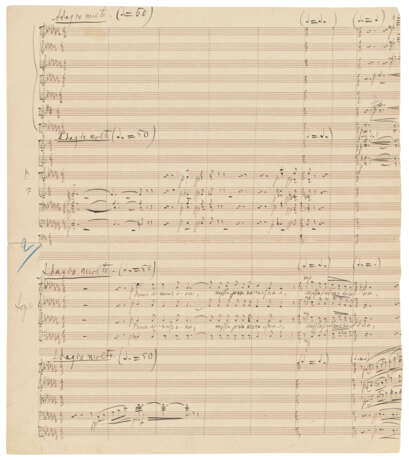ID 1053224
Lot 110 | Pyotr Il'yich Tchaikovsky (1840-1893)
Estimate value
£ 70 000 – 100 000
Autograph music manuscript, two substantial sections from the opera Mazepa, comprising the end of the love scene between Mariya and Mazepa at the end of Act 2, and the second half of the Finale in Act 3, n.d. [1882/3]
From the autograph fair copy of the original score for Mazepa. Rare at auction: one of only three substantial Tchaikovsky autographs to have appeared at auction in at least 40 years.
Full score, the Act 2 section also including the piano reduction in the two lowermost staves. Fair copy with a number of erasures, and some cancellations and emendations. In brown ink on 26-stave paper, 36 pages, approx. 396 x 350mm, including the composer's rehearsal letterings and a few red and blue crayon and pencil performance markings, paginated in pencil on rectos 97-[110] and 113-[134], title added in pencil in a mid-late 20th century hand (rough excision to left margin of first leaf of the Act 2 manuscript, perhaps removing an ownership stamp).
Provenance:
(1) By repute in the collection of Aaron Rubinstein (b.1850), and by descent.
(2) Christie's, 2 June 2010, lot 219 (sold after sale).
(3) Schøyen Collection, MS 5442.
Mazepa was first performed at the Bolshoi Theatre in Moscow on 3/15 February 1884, conducted by Ippolit Altani, swiftly followed by a performance before Tsar Alexander III at the Maryinsky Theatre in St Petersburg on 6/18 February under Eduard Nápravník (though Tchaikovsky caused some bemusement by failing to attend the latter, having left the country on the day after the premiere). A month later, the composer undertook some revisions to the score with a view to the opera's revival in the following season on 10/22 September. He described these in a letter to Nápravník on 26 March/7 April: 'I have made the following changes: 1) At the end of the first scene in Act I, after Mazepa's words "So men, to your horses", I have made a shorter ending in E major in order not to hold up the action, which suffers here from an excess of music ... 2) In the second scene of Act II, I have made an enormous cut in the scene between Mazepa and Mariya (here Mazepa's part is not only cut, but is practically written afresh... Mariya also has something new, but very brief). 3) In the last number of Act III the lullaby has been somewhat lengthened, and it now concludes the opera'. The sections cut in the second and third of these revisions are those in the present manuscript: the autograph (at the Russian National Museum of Music, KP 1200. Fund 88. No. 30b and 30v) preserves the stubs of the leaves from the last section where they were excised from Act 3 by the composer. Although included in the published vocal score of August 1883 (where there is an interesting difference in the tempo marking of the Lento, at minim = 64 in the published text (p.171 bar 4) against minim = 46 in the manuscript (p.109)), these sections do not appear in the posthumous first edition of the full score (1899); they are therefore unpublished in their full orchestration.
Mazepa, set in 18th-century Ukraine and based on Pushkin's narrative poem, Poltava, was Tchaikovsky's seventh opera: he had started work by September 1881, working on a libretto by Viktor Burenin which he revised extensively, with some contributions from others; he completed the opera on 16/28 April 1883. The period of composition was dogged by Tchaikovsky's nagging loss of faith in his abilities as a composer ('Never have I had such difficulties with a large scale composition as with this opera', he wrote to Nadezhda von Meck on 26 September 1882), and he seems to have had particular difficulties with its orchestration. Nevertheless, it is one of the most powerful of Tchaikovsky's operas, with its themes of tragic love and political betrayal, and its hero's role as a controversial figure of Ukrainian independence, retaining intense contemporary relevance.
| Artist: | Petr Ilich Chaikovskii (1840 - 1893) |
|---|---|
| Place of origin: | Russia |
| Auction house category: | Letters, documents and manuscripts |
| Artist: | Petr Ilich Chaikovskii (1840 - 1893) |
|---|---|
| Place of origin: | Russia |
| Auction house category: | Letters, documents and manuscripts |
| Address of auction |
CHRISTIE'S 8 King Street, St. James's SW1Y 6QT London United Kingdom | ||||||
|---|---|---|---|---|---|---|---|
| Preview |
| ||||||
| Phone | +44 (0)20 7839 9060 | ||||||
| Buyer Premium | see on Website | ||||||
| Conditions of purchase | Conditions of purchase |








